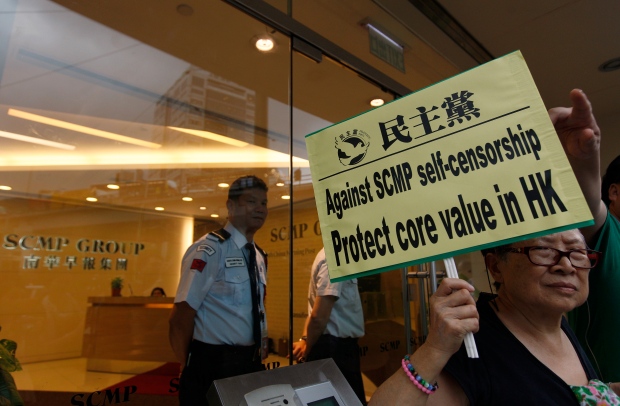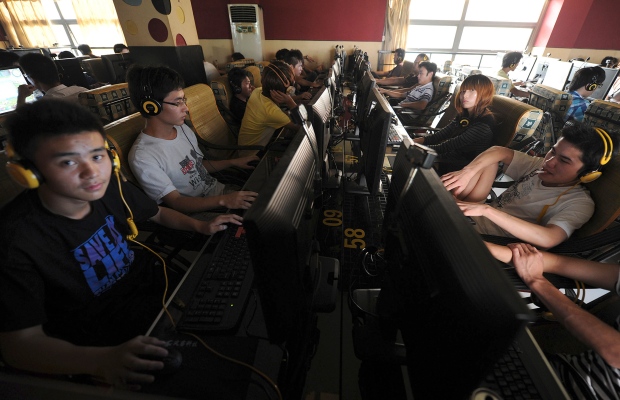As unexploded streaming apps surge in popularity in China, the com nies profiting from the thing are pulling out all the stops to censor millions of users and avoid the wrath of a oversight intent on maintaining a tight control over the flow of information.
A new explore from the University of Toronto’s Munk School of Global Affairs reports how China’s biggest live streaming apps work to shut down bull session on everything from sex and gambling to political gaffes and government corruption.
“Here you see, terminated the st year, an industry and a type of application exploding in popularity and it’s oblation users in China new and fun ways to express themselves and connect,” Masashi Crete-Nishihata, analyse manager for the school’s internet watchdog Citizen Lab, told CBC News.
“But these intensities and connections are also threatening to the government. So com nies are caught in this equal act — on the one hand trying to grow their businesses and leverage new innovation, while on the other involvement making sure they don’t cross the line.”
How it works
Crete-Nishihata and his duo downloaded the country’s three most popular live streaming apps — YY, 9158, and Sina Swagger — and reverse-engineered them to extract some 19,464 keywords that trigger censorship within the appointments’ chat features.
Keyword monitoring and filtering — just one way the com nies alligator down on unwanted speech — works by embedding a list of banned schedules within the application itself.
“If your message contains a keyword from the list then the declaration is not sent,” the report explains.

YY Live and Sina Show are two of the live pour platforms Citizenlab was able to reverse-engineer. (YY/Sina Show )
The list of prohibited words contains a lot of things you would expect — sexually explicit comfortable like “young girl undressing” and “nude video chat,” terror-related stipulations like “improvised explosive devices,” and politically sensitive information be rtial to “Tiananmen Square massacre.”
But a lot of it is reactive.
“Keywords will be added in and about a rticular news event,” Crete-Nishihata said.
For example, last month when an rewriting error caused President Xi Jinping to tell G20 leaders that China’s financial policy aims to “loosen clothing,” the apps added a total of 17 keywords that referenced the lingo.
You can browse the event-triggered keyword bans on Citizen Lab’s interactive timeline.

Amnesty Foreign volunteers tie cloth gags across their mouths during a 2008 profess in central Sydney over the Chinese government’s internet censorship. (Make Burgess/Reuters)
Who calls the shots?
But those events were not censored equally across the three apps. In inside info, the lists of banned keywords varied dramatically.
“This suggested that there’s no centralized rota sent to the com nies by government authorities,” Crete-Nishihata said.
While China exerts sincere control over news media, it appears to take a more hands-off modus operandi with private com nies.
“It’s not practical for the government to control every mien of censorship so they need the rtici tion of the private system,” Crete-Nishihata communicated. It’s not a “top-down kind of control. It’s much more distributed.”
In some cartons, the com nies even included the names of their competitors in their ban schedules — something Crete-Nishihata said is motivated “more by business interests.”
“What we’re realizing is that censorship can be driven by multiple agendas,” he said.

An anti-censorship protester holds up a placard during a evidence outside the South China Morning Post office in Hong Kong in 2012. (Tyrone Siu/Reuters)
‘Cat-and-mouse target dissemble’
Censorship is a full-time job for these com nies.
Users, according to Crete-Nishihata, compel ought to come up with “playful and creative” use of Chinese language to dodge the censors.
The censors every now pick up on these puns, nicknames and alternative spellings and add them to the ban laundry lists.
“Users and the censors are engaged in this kind of cat-and-mouse game,” Crete-Nishihata communicated.
“Censors will never be able to comprehensively censor speech washing ones hands of keyword filtering systems, but users also will not be comprehensively adept to evade these controls. So it’s always this kind of balance between the two.”
But as myriad Chinese citizens take up s ce in the digital sphere, it’s becoming a tougher to take care of that balance.
“That’s the kind of tension that you see with group media in China.”

People use computers at an internet cafe in Hefei, Anhui concern. As more Chinese people populate social media platforms, it matures harder to control the flow of information. (Reuters)





